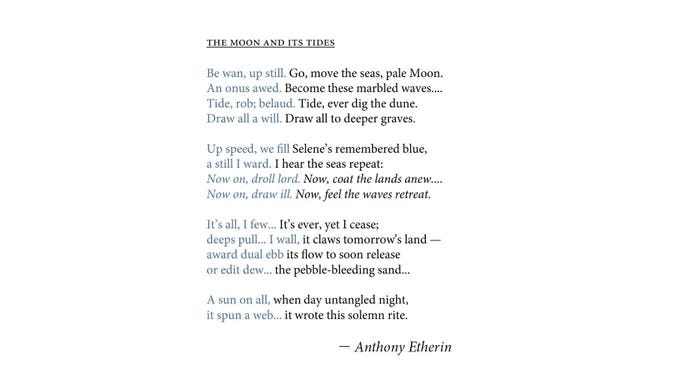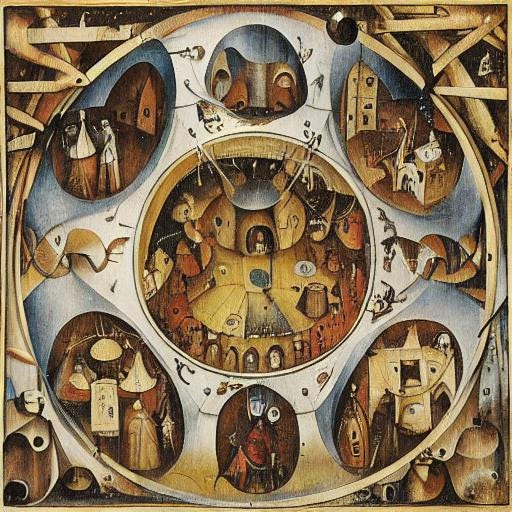Friday Footnotes: The Beauty of Constraints
The range of poetic constraints from Anthony Etherin to Diane Seuss, reviews of Oppenheimer and Beau is Afraid, several alternatives to Goodreads, and more
‘Sup everyone.
Here’s another edition of Friday Footnotes that would be more aptly titled “Fortnightly Footnotes” since there was no post last week. It’s a tired excuse but health issues are wearing me down. The plus side is that I’ve been spending more time reading and watching movies than usual.
I’ve also been tentatively exploring Twitter (or X, as it’s supposedly called now) for the sole reason of sniffing out some of Anthony Etherin’s poetry and, lo and behold, I come upon this insane piece of craftsmanship:

At first glance it looks like any old sonnet, but no. In Etherin’s words it’s:
A Shakespearean sonnet in iambic pentameter, which can be split into two smaller sonnets, one in trimeter (black) and the other in dimeter (blue). The blue dimeter sonnet is Petrarchan and also a palindrome.
As if it isn’t hard enough to write what is essentially a contrapuntal sonnet, he makes one of those sonnets (the left one, in blue) a palindrome.
I happened to read this poem around the same time (or same day perhaps) I finished Diane Suess’s excellent poetry collection frank: sonnets, which are only sonnets in the loosest possible sense of the word—that is, they’re each 14 lines long (or 14 stanzas, really). And yet they’re so compulsively readable I couldn’t care less whether or not they adhere to the formal rules of sonnet-writing—they were just fun to read for the resonance a reader like me cracks open a poetry book for in the first place.
And this happily coincided with my reading of
’s craft tips on utilizing constraint as a tool, in which she shares her own 14-line verse (which she dubs “nonnets”).All of this got me thinking about the role constraint plays in poetry. Does adding layer upon layer of constraints make a poem better than a loosely-shaped piece of verse? Does it make it easier, or harder, to write? Does it even matter? Let me know what you think in the comments.
✒️: Anthony Etherin is extremely active on Twitter (or X…whatever), so you can find heaps of his tightly constrained literary contortionism over there. Loathe Twitter/X? No problem! It turns out
is on Substack, so feel free to check him out over here as well.🎙️: Etherin also runs Penteract Press (which has it’s own substack here:
) and hosts the Penteract Podcast, which I enjoy for the interviews with the kinds of experimental poets you won’t find on the likes of, say, The New Yorker: Poetry podcast.📰: By sheer chance I’d been mulling over the value of highly contrained poetry vs free verse at the same time I recieved this timely post from
about using some minor constraints as a tool: “Think of form not as the final “destination” for the poem but also as a way to get there.”📚: Diane Suess, author of frank: sonnets, isn’t quite the opposite of Anthony Etherin when it comes to style but the sonnets filling her excellent Pulitzer Prize-winning collection are more like the “nonnets” Maggie Smith describes in the link in the previous footnote. But man are they good: I haven’t burned through a book of poems so quickly since reading Bukowski’s The Pleasures of the Damned (which I relished). What a read.
Rating: 5/5 Stars
🎞️: I had the pleasure (if you could call it that) of seeing the absurdist horror/comedy Beau is Afraid in theaters recently. This was one of the weirdest, most polarizing films of late: people either view is as a not-at-all-scary snooze-fest of a film with an over-the-top Joaquin Phoenix and a running time of nearly 3 hours that was wholly unnecessary; or they found it deliciously anxiety-inducing with scenes so bizarre and violent that they’re low-key hilarious topped with amazing performances by everyone involved (especially Nathan Lane, in my opinion). My take on the film is that it’s somewhere in the middle of this dichotomy: it’s nerve-wracking, but not scary; it’s epic, but too long; and it’s hysterically absurd, but overdone at times (we really didn’t need the attic scene near the end—you’ll know what I mean if you see it).
Rating: 3.5/5 Stars
🎞️: Oppenheimer was released here in South Korea last week (not-so-coincidentally on August 15th: 광복절 a.k.a National Liberation Day of Korea—when Japan’s colonization of Korea ended with a bang [or two]) and the film was nothing short of a masterpiece. Yes, it was long (about 3 hours) yet it somehow managed to make an opaque subject like theoretical physics so gripping I didn’t glance at my watch once. It does have one mark against it…I’m probably never going to see it again. I’ll revisit Inception and Memento and The Prestige and any other Christopher Nolan film at some point down the road; but as sublime as Oppenheimer was: once was enough.
Rating: 4.75/5 Stars
🔗: I’ve been active on the book tracking site Goodreads for about a decade now, and as useful as it’s been for finding new books to read in the past, the recommendation algorithm seems broken to me now. I’m also not a fan of Amazon (which bought the company some years ago), so I’m considering switching to a new platform. This article lists several Goodreads alternatives for the Amazon-averse.
🔗: This fun Book Riot article has you guess the fantasy book based on a few 1-star reviews. I learned two things from this piece: 1) That I am completely out of touch with modern fantasy novels (I couldn’t guess any of the books correctly) and 2) that sometimes a bad review makes me want to read the book more than a rave review.
🎧: I’ve been a fan of Neil Gaiman since devouring the Sandman graphic novels in my early 20’s. I loved Good Omens and American Gods as well. (The TV adaptations of these…not so much.) But I’ve always found him to be a great speaker and nurturer of aspiring fiction writers; and the interview below (despite being a few years old now) is one of his best. Enjoy.








Writing a palindromic poem? Hats off!